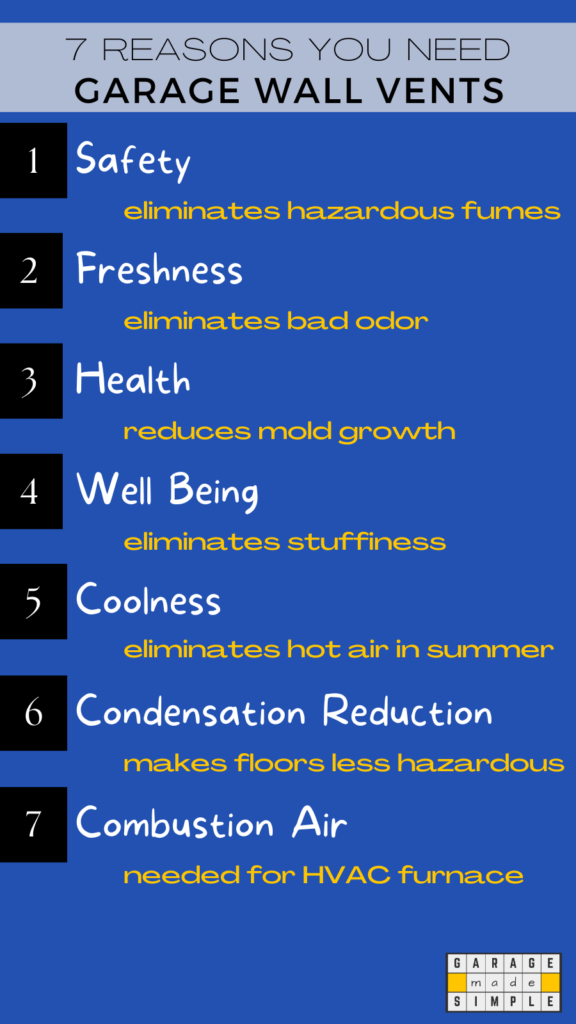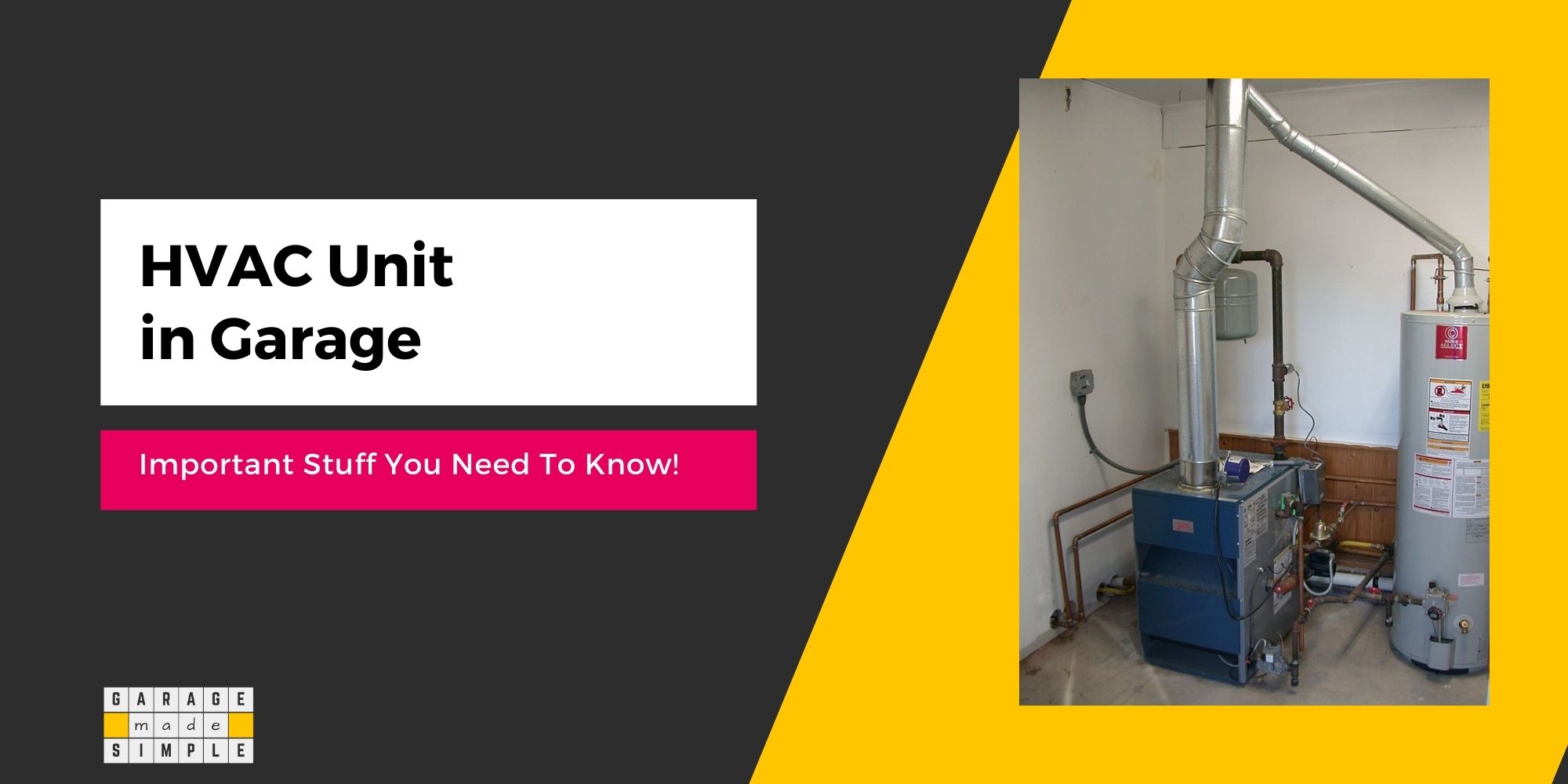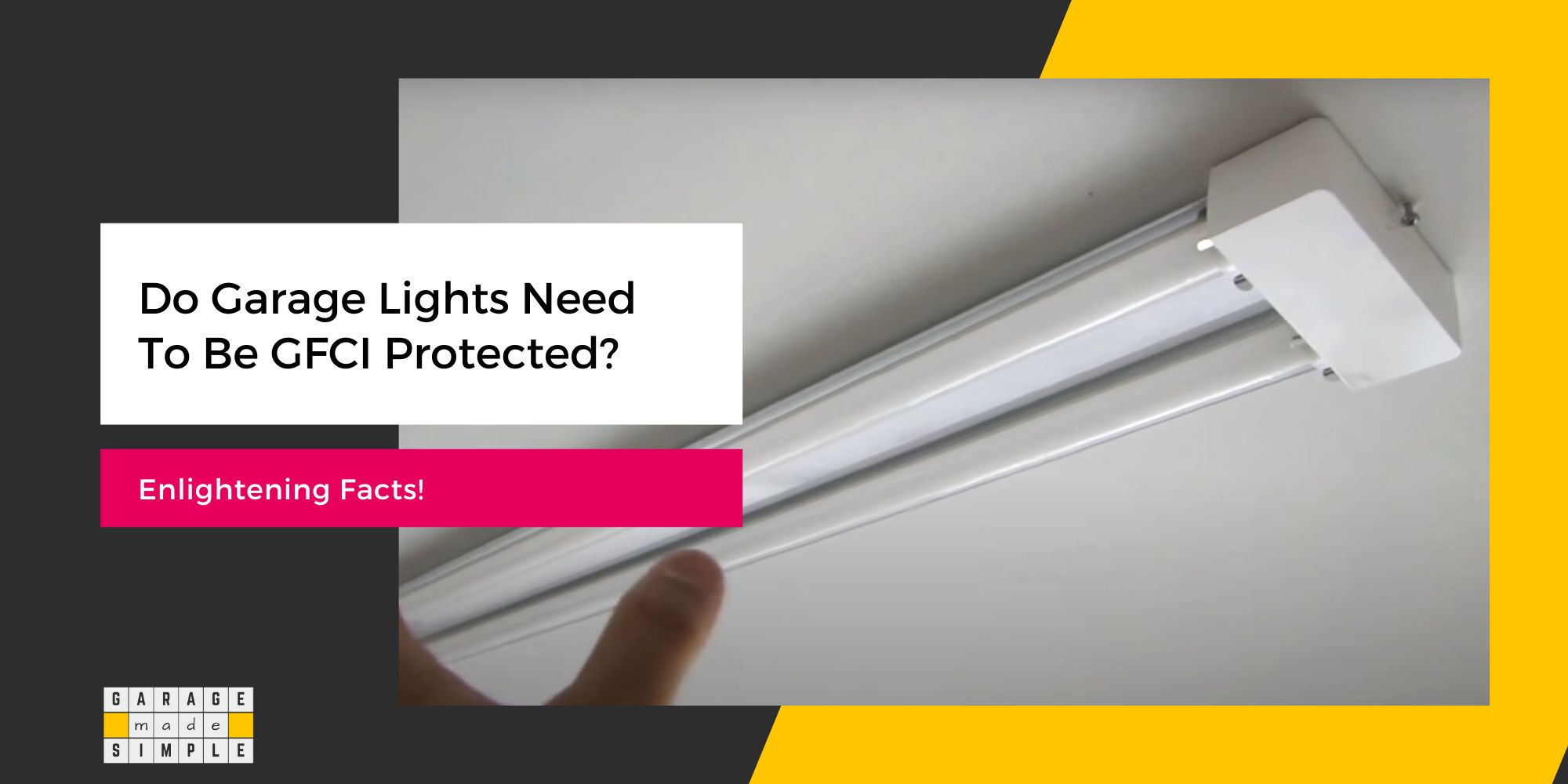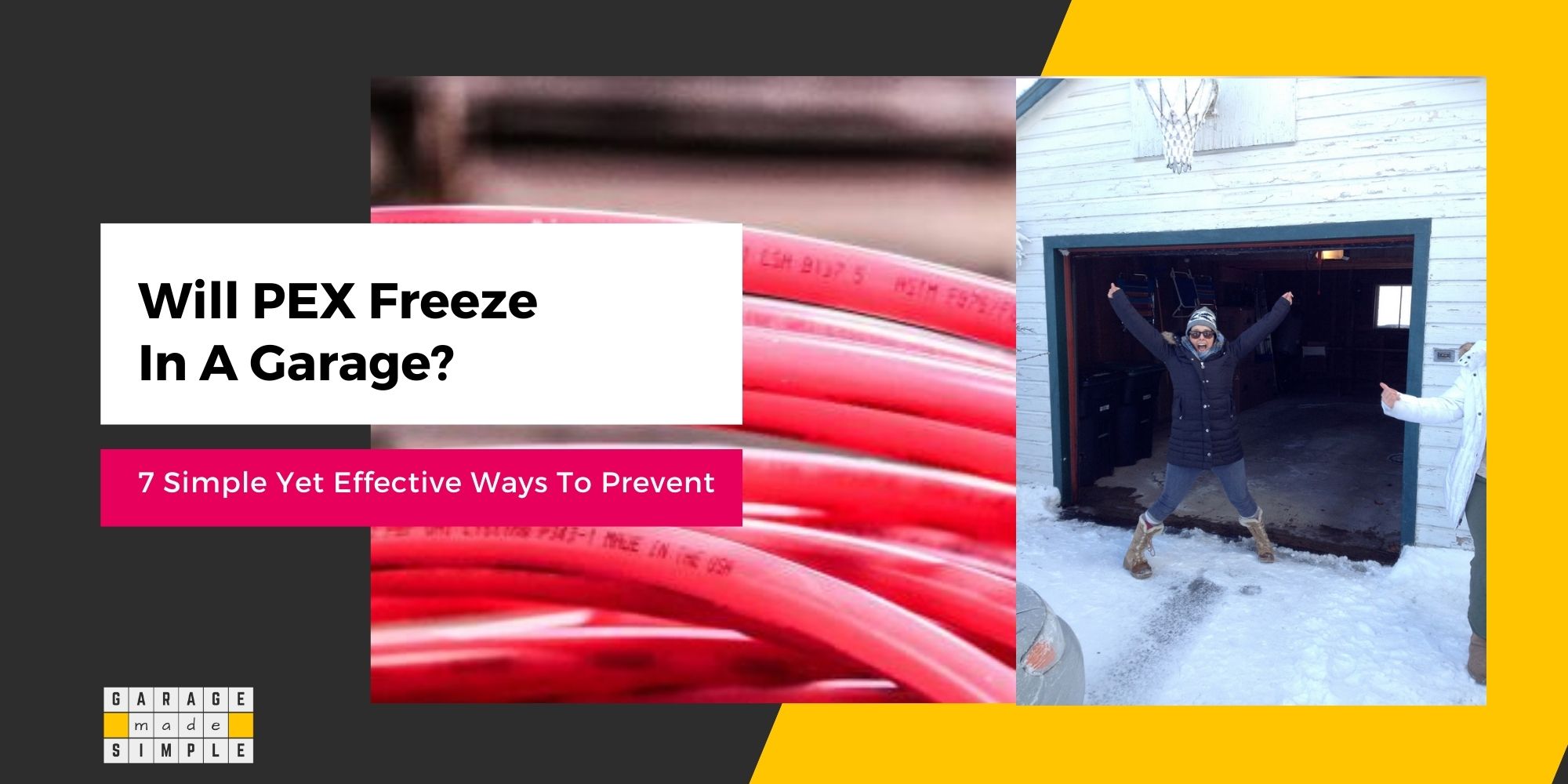Why Have Garage Wall Vents? (7 Important Reasons You Need To Know!)
As an Amazon Associate, I earn from qualifying purchases.
Why Are There Vents in Garage Walls?
The importance of garage wall vents is, quite often, not understood. Some people even wonder if they are better off closing the garage wall vents to reduce heat loss. Please do not do that.
There are 7 Important Reasons why there are vents in your garage walls.
The Garage Wall Vents are there for:
- Safety – Eliminate hazardous fumes
- Freshness – Eliminate Bad Odor
- Health – Reduce Mold Growth
- Well Being – Eliminate Stuffiness
- Cooling – Eliminate Hot Air in Summer
- Reduce Condensation – Make Floor Safer in Winter
- Combustion Air – for HVAC Furnace

Vents are a passive form of ventilation as they do not require any energy source. They may have to be augmented with active ventilation devices such as fans, exhaust fans, air conditioners, etc. though.
1. Garage Wall Vents Are Essential for Eliminating Hazardous Fumes
A residential garage, especially an attached garage, is considered as a high risk zone for accidents and mishaps. There are many risk factors such as fire, slippery floor, etc. An important risk factor (which is unfortunately often ignored) is that from hazardous fumes.
Carbon Monoxide
Carbon Monoxide is a “killer” gas which is part of the exhaust emissions from a car.
Carbon monoxide (CO) is a poisonous, colorless, odorless and tasteless gas. Although it has no detectable odor, CO is often mixed with other gases that do have an odor. So, you can inhale carbon monoxide right along with gases that you can smell and not even know that CO is present.
Source: OSHA Fact Sheet
Carbon Monoxide can be fatal as it deprives the heart of oxygen. In a residential setting Carbon Monoxide can cause you to lose consciousness and suffocate while you are asleep.
You should never let your car idle, for too long, in an attached garage, especially if the garage door is closed.
Gasoline Fumes
Gasoline fumes are bound to be there in a garage. The source could be storage of extra gasoline, leaks from the car or spills. Whatever the reason, gasoline fumes are highly flammable. An electric spark or a carelessly disposed cigarette butt could easily ignite and result in a disaster.
Chemical Fumes
Most garages are used as workshops and storage too (in addition to parking cars). All kinds of chemical products such as paints, adhesives, cleaning chemicals, etc. are used and stored in the garage. They emit chemical fumes. Some of them could be a hazard or health risk.
Garage Wall Vents help disperse the carbon monoxide, gasoline & chemical fumes and make your garage safe.
2. Garage Wall Vents Help Reduce Bad Odor
It is not uncommon for many garages to smell bad. There are several reasons for this
Garbage Bins
Your home creates garbage, especially in the kitchen, all day. By night your kitchen garbage bin is overflowing. What do you do with all this garbage? The municipal corporation will collect the garbage only once a week, maybe twice a week in bigger communities.
Most people will transfer the small garbage bags from the house into a much larger garbage bin, usually kept in the garage. Quite often the garage is hot and humid. The waste food can putrefy fast and raise quite a stink.
Clogged Drains
Most garages have floor drains to clear the rain water and the snowmelt. Some even have drains from an enclosed laundry room, a mudroom or an utility sink in the garage. The drains must lead to the main sewage water drain (not the storm water drain) as per regulation.
Before you know it they are getting clogged up. Leaves or even dead mice are quite likely to be decaying in the clogged floor drain of the garage. Putrid smell may start wafting into your garage from the sewage drain if the trap has a problem or a leak.
Clogged drains almost always lead to bad odor.
Pet Odor
If you own a dog or a cat, they will be spending much of their time in the garage. Pets have a variety of smells associated with them, not all pleasant, unfortunately.
There is cat food and dog food, cat litter and dog pee to deal with. Try to make your garage as pet friendly as possible, especially when it comes to giving them a place to pee & poo.
Garage Wall Vents will help reduce, if not eliminate, the bad odor of garbage, mold, drains and pets and make your garage smell good.
3. Poor Ventilation Promotes Mold & Mildew Growth
Mold & Mildew in the garage give off a typical musty smell. They are also quite harmful to your health, especially if you suffer from respiratory health issues.
Both mold & mildew are fungi and have the same basic requirements to thrive.
- Organic food sources such as wood, textiles, paper etc.
- High humidity or damp, wet surfaces
- Some warmth
- Dark, dingy lighting conditions
- Poor air circulation
Garage Wall Vents improve air circulation, discourage mold & mildew growth and keep you healthy.
4. You Get Air Circulation Using Garage Wall Vents
The right amount of air circulation is important both for physical health and mental well-being.
It is so important that there is an ANSI/ASHRAE Standard 62.2-2016 which describes the minimum requirements to achieve acceptable Indoor Air Quality (IAQ) via dwelling-unit ventilation, local demand controlled exhaust, and source control.
Sometimes, it is argued that a garage is not to be considered as a part of a house, so any standards applicable to a dwelling unit need not be applicable to a garage unless specifically stated.
I am not an expert on legal or insurance matters, but JERRY INSURANCE AGENCY a licensed insurance agency in 50 states has this to say on their blog published Jan 2021
When it comes to your garage, as long as it’s attached to your home, it’s considered a part of your main dwelling. The same goes for any other structure directly connected to your home, whether that be a deck, porch, sunroom, or other structure.
In any case, since you spend a fair amount of your time in the garage, the garage is “de facto” a living space. You must ensure you have the minimum required ventilation.
Strategically placed Garage Wall Vents are a free & passive garage ventilation option to keep the air moving.
5. Wall Vents Keep The Garage Cool in Summer
Hot air is lighter than cold air and therefore rises up. This simple principle can be used, not only to set up air circulation within the garage but also to cool the garage during warm weather.
In summers, the temperature inside a garage will become higher than the outside temperature. This of course assumes that the garage is not correctly insulated for the hot season and is not climate controlled using an air conditioner.
Strategically placed garage wall vents can get the air circulation going naturally.
A few vents on the higher end of the garage wall (nearer to the roof) or preferably garage roof vents, will let the hot air garage out. A few vents in the wall, just a couple of inches above the floor will pull in the cooler outside air to compensate.
Garage Wall Vents are the easiest and the cheapest (actually totally free!) way to cool a garage.
6. Condensation on the Garage Floor will Reduce with Wall Vents
You need to watch out for a slippery garage floor. Garage floors are more likely to be slippery than most floors in your home. They could be almost as bad as a wet bathroom floor. Super glossy epoxy floors, oil slicks and frozen ice films are all recipes for a disaster waiting to happen.
The air in the garage is still warm from the garage heating (or the heat of the recently parked cars) before you retire for the night. Once you switch off the garage heating and go inside the house, the garage air starts to cool down.
Heavier colder air settles to the garage floor. Meanwhile, the grade below the garage floor is getting pretty cold. The water vapor in the cold air in contact with the cold garage floor will condense into dew drops once the temperatures drop below the dew point.
Condensation on the garage floor can result in a slippery garage floor next morning. Worse, on really cold nights, the condensation may even freeze into a thin layer of slippery ice.
Vents are useful as they keep the air in the garage moving due to natural convection. The air circulation will reduce the possibility of the garage air temperature dropping below the dew point. You will have less chance of ending up with a damp garage floor.
Condensation on the garage floor will be reduced by having wall vents.
7. Garage Wall Vents let Combustion Air In for the HVAC
The HVAC unit uses a furnace to generate heat. The furnace transfers the heat to a heat exchanger. A ducting and vent system brings the cold air from the house to the heat exchanger and takes the hot air to the different rooms.
It is not unusual to have the HVAC unit and the Water Heater unit within the garage. The furnace of the HVAC unit requires air for combustion. Where is the air going to come from?
This air (Combustion air) is sucked in into the garage through the Garage Wall Vents.
Without Garage Wall Vents the furnace in the HVAC will not be able to function.
Bottom Line
The bottom line is that garage wall vents are very important for 1) Safety 2) Freshness 3) Health 4) Well Being 5) Cooling in Summer 6) Reducing Condensation in Winter and 7) Letting in Combustion Air for the HVAC Furnace.
Thank you very much for reading the post. I do hope you found it informative and useful.






